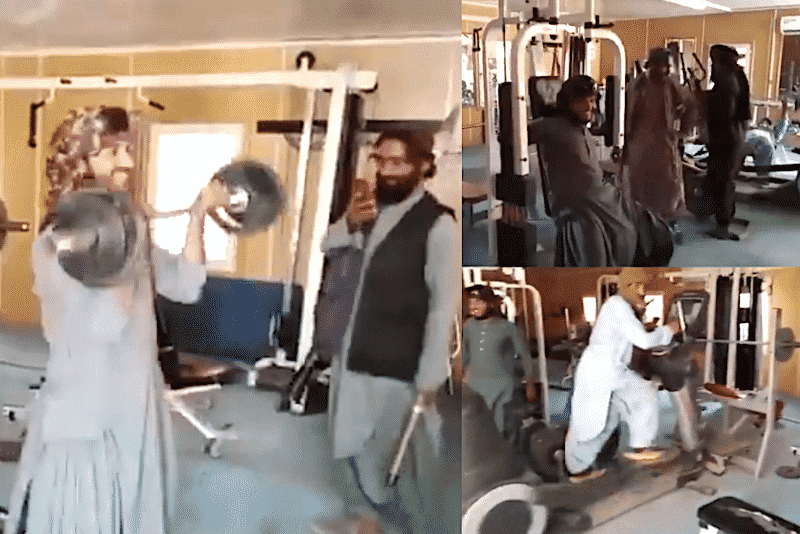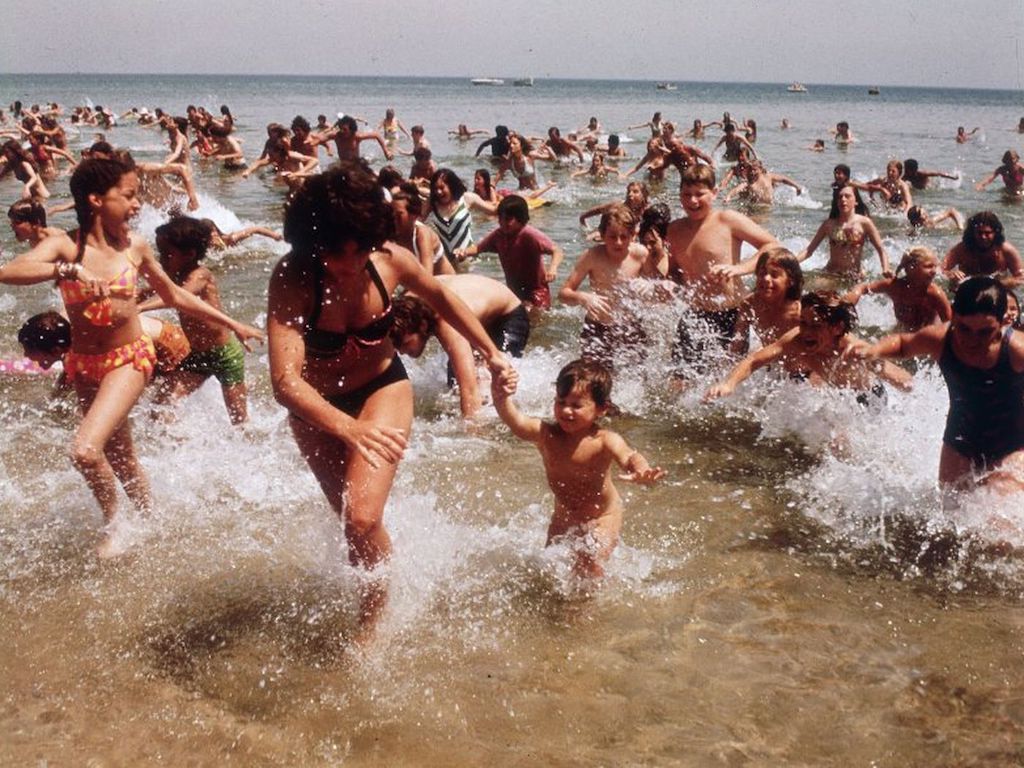"It's time to listen to the men who served on the ground and not the pundits and 'policy experts' who have been consistently wrong since 9/11."
(Editor’s note: Peter Maguire is a surfer, war crimes investigator and author of Thai Stick: Surfers, Scammers, and the Untold Story of the Marijuana Trade, Law and War, Facing Death in Cambodia and Breathe, the new bio on jiujitsu icon Rickson Gracie. Ain’t much ol Petey can’t do. The following story, which covers the US’s sudden withdrawal from Afghanistan after two decades, appears on Pete’s substack Sour Milk, subscribe, it’s free etc.)
True to President Biden’s words, the American retreat from Afghanistan does not look like the 1975 fall of Saigon.
It looks more like the fall of Phnom Penh, Cambodia, when a similarly mysterious Stone Age army marched into the Cambodian capital on April 17, 1975.
Like the Chinese-backed Cambodian Maoists, the Taliban also rejects the western human rights regime and is quickly replacing it with a homegrown variant of Sharia law and more traditional concepts like vae victis – woe to the conquered.
عناصر "#طالبان" يمارسون الرياضة في قاعة جيم بالقصر الرئاسي في #كابل pic.twitter.com/A2ZraOqHtm
— Mulhak – ملحق (@Mulhak) August 16, 2021
Even though more people have entered America illegally this year than did in the past twenty, very few Afghans have been among them. It is becoming painfully clear to many of those who worked for and fought with the United States in Afghanistan that they will not get asylum.
These Afghans will not blame the Bush, Obama, Trump, or Biden administration. They, according to Pashtunwali code (the common law of the Pashtu tribes and many others in Afghanistan), will blame America and so will their children and their children’s children.
In Afghanistan, there is no time limit or statute of limitations on revenge.
When I saw the Taliban closing in on Kabul last week, I reached out to people I knew who had served in combat there.
I think that it is time to listen to the men who served on the ground and not the pundits and “policy experts” who have been consistently wrong since 9/11.
I asked these veterans three questions:
- What does the fall of Afghanistan mean to you?
2. What does the fall of Afghanistan mean to America?
3. What lessons will we fail to learn from the fall of Afghanistan?
I was so impressed by the responses I received that I decided to publish the first batch of answers in full, and only edited them for clarity.
RESPONDENT 1
Respondent 1 rose from Army private to major, and served five combat tours, three of them in Afghanistan.
We all join the Army to “win,” in various ways, including winning in any wars that we may engage in during our career. No one joins the Army to lose. I lost 25 friends, comrades, subordinates, and superiors in my 5 combat tours, according to my last count about 5 years ago. I never tried to separate out between Iraq and Afghanistan and am not going [to] do it today. But I lost enough. Also I have a personal friend who survived losing both legs above the knees, who is not doing so well.
The personal part of me is angry that we lost, and that all of our deaths and sacrifice were in vain. I spent the majority of my adult life so far, learning about, training for, fighting in, and recovering from Iraq and Afghanistan. Yes, I lost those years, and wasted much effort. But I did gain a lot as a person. It made me a better leader and a manager, giving me all of my skills and experiences to succeed today as an entrepreneur in a field almost completely unrelated to the military and warfighting.
I know that many soldiers have also succeeded in that transition, while others have not. I wish sincerely that all of us do, eventually.
But on a higher level, I am happy that we finally put an end to this misguided adventure. We didn’t start the war. Al Qaeda under Osama bin Laden did, by attacking us in NYC and DC on 09/11/2001. But instead of chasing him to the ends of the earth, we turned around at Tora Bora, and decided inexplicably to turn Afghanistan into a modern liberal democracy in the likeness of Southern California.
That alone would’ve been a futile but valiant effort, but along the way we started making compromises, by aiding and abetting a corrupt kleptocracy that practiced Bacha Bazi (Organized Child Sex Abuse) and industrial level Opium Production, which fed right into our poorest areas after being refined by our own “pharmaceutical” corporations.
We deserved to lose when we lost our way.
Let’s not forget that we accomplished the original mission. We dismantled Al Qaeda in Afghanistan, and killed Osama bin Laden and all of his “lieutenants.” We failed in nation building in Afghanistan, which was a mission creep, not our original mission.
But the cost in men and treasure was so great. We need to hold our leadership accountable.
That no SecDefs, and no Generals are held accountable for this devastating record of loss is unfathomable. We must bring them to justice. My 25 friends did not have to die. Some of them died while guarding Dick Cheney owned Ice Cream convoys carrying all 31 flavors of Baskin Robbins ice cream. We lied to their parents that they died while protecting our freedom and democracy.
RESPONDENT 2
Marine sergeant Neal Zumbro was 19 years old when he took part in the invasion of Iraq. Next, he served in Afghanistan, before returning to Iraq in 2005. In 2008, three years after he was honorably discharged from the Marines, Zumbro, now a college sophomore, was “involuntarily recalled,” and served a fourth tour in Iraq.
It definitely looks hasty and incompetent. For a country that has been in control of the U.S., and for the most part, dominated the battlefield for almost 20 years, it looks like we failed to have an exit strategy.
No way I buy the idea that the Biden administration believed withdrawing troops in the summer was a good idea. Everyone knows the Taliban slows down combat operations in the winter. Everyone that fought over there knew they were just waiting for us to leave to come out of hiding and return to take back control the nation.
To leave so hastily without expecting a late summer surge, to leave so much expensive technology and weaponry behind, is not only a slap in the face to every combat veteran, it’s a slap and spit in the eye of every taxpayer. Worse, it is a punch to the face of every American family member who has received a folded American flag.
The failure in Afghanistan and the global war on terror should be the subject of a serious government investigation.
What does our retreat say about America and the Global War on Terror?
The American defeat in Afghanistan shows Western civilization is not something we can package and sell. We can, however, be effective in specialized offensive counter terrorism and provide safety to our nation. This is something that all nations have a right to. The war was not a failure, the retreat is looking like one, but the war was not.
Our volunteer military patriotically went into a meat grinder and took the fight to a seasoned enemy in some of the toughest battlefields on Earth. The spirit of America was on full display as men and women from two generations deployed down range in belief that we could bring freedom and opportunity to the oppressed people of Afghanistan. Only time will tell if the Taliban will recognize human rights and rule Afghanistan with dignity and honor, providing both safety and opportunity to the people of Afghanistan, something we failed to do.
Please add any other thoughts you might have.
While my comments may be different from a lot of other veterans that served, I, too, am deeply hurt by the friends I lost. I was not spared from post-traumatic stress from doing what I did, and seeing what I saw as a part of Operation Enduring Freedom. But I also know the Taliban bled too, and the people of Afghanistan have suffered and will continue to suffer just like so many veterans back home today. Right now America needs leadership. This hasty withdrawal of troops has only deepened the power vacuum and sets us up for more bloodshed in the future.
RESPONDENT 3
“Taff”served with the British special forces in the initial hunt for Osama bin Laden in late 2001 and returned to Afghanistan for other deployments later.
Pete,
Hi, I guess I’d give my thoughts on the current state of affairs. For me it’s as I always expected. I first arrived in Afghanistan in the late winter of 2001.
Luckily or unluckily, we were already deployed in the Omani Desert conducting desert reconnaissance training and parachute training. We flew first to Pakistan where a small coalition base was assembled and then onto Bagram and then Anaconda [Operation Anaconda 2002].
I brought with me several books on the first and second Afghan wars and a collection of WW1 literature by Captain Siegfried Sassoon.
As we landed, the scene that met us wasn’t hardly different at all than the books I was holding from the 1800’s on the Great Game. Then, [Afghanistan] was the buffer that held Russia from India and the British there to hold them back, now, or in 2001, [it didn’t seem] all too different. Not long previously, we’d all seen the attacks on the Twin Towers and were looking forward to the hunt. A few days later we’d deployed at night on the Pakistan border near a town called Kowt [near] a large dried up river valley…[on] the border between Pakistan and Afghanistan. It was there that we observed caves on our useless, but accurate, Russian maps. His caves must have changed hands for centuries and [were] heavily fortified. One in particular was being emptied by tribesmen allied to “our enemy” (I’ll not say AQ or Taliban, neither were a single group and [this is] just a whitewash label/term used to describe them). We confirmed multiple targets and requested an air strike.…Nothing. Again we requested and were told to wait. An hour later, as we watched her last ass of an ass (pun intended) disappear into Pakistan, our request for air was granted. Too late. That was the story of Anaconda day in day out pretty much, they’d engage in a fight if you found them, but [there were] many times when requesting anything bigger than 7.62 [a NATO rifle cartridge] on a large target turned into [a] joke. Many stories and rumors spread during that period, including M Sqn’s [British Special Boat Service] assault on the cave that without doubt held Bin Laden [was] ordered to abort. Why?
Years later, I worked in Helmand for another group. There I [saw] the political hand that controlled the tactics of the fighting man.… It should have been an intelligence controlled and special operations fought war…, that would have achieved far more for less, and I’m including casualties.
What I’m witnessing now is another “Retreat from Kabul” [1842, also known as “the Massacre of Elphinstone’s army”]. 16,000 [British] died in that retreat, with only surgeon William Brydon arrived injured, along with his injured horse, having battled through skirmishes for days. Arriving at the fort gates at Jalalabad [he was] famously asked, “Where are the army?”
To which he replied, “I am the army.”
If I were to think of this strategic defeat too long, I’d probably go nuts.
For veterans and those serving, the mindset should always be, we fought well and we won every fight, same as Vietnam. No one failed here apart from the rubber-spined generals looking to feather their cap and politicians. Afghanistan [is] now China’s gold mine and the Taliban’s sinister toy.
I’ll leave with the last page of Siegfried Sassoon’s letters and the only one that wasn’t a poem, a letter he wrote to the Times of London on the 31st July 1917, and one he could have been shot for during the period:
I am making this statement as an act of wilful defiance of military authority, because I believe the war is being deliberately prolonged by those who have the power to end it.
I am a soldier, convinced that I am acting on behalf of soldiers. I believe that this war, upon which I entered as a war of defence and liberation has now become a war of aggression and conquest. I believe that the purposes for which I and my fellow soldiers entered upon this war should have been so clearly stated as to have made it impossible to change them, and that, had this been done, the objects witch actuated us would now be attainable by negotiation.
I have seen and endured the suffering of the troops, and I can no longer be a party to prolong these sufferings for ends which I believe to be evil and unjust. I am not protesting against the conduct of the war, but against the political errors and insincerity’s for which the fighting men are being sacrificed.
On behalf of those who are suffering now I make this protest against the deception which is being practised on them; also I believe that I may help to destroy the callous complacence with which the majority of those at home regard the continuance of agonies which they do not share, and which they have not sufficient imagination to realise.”
RESPONDENT 4
RESPONDENT 4 is a former active duty U.S. Army Officer who served in the infantry and military intelligence on multiple deployments to Afghanistan with frontline combat units.
What does the fall of Afghanistan mean to you?
For many—most, I’d say—serving in Afghanistan was never a joke or a way to get promoted, or make a name for ourselves, or use the opportunity to stair climb into a cushy assignment, or nab a book deal, or any of the myriad other things for which many others have used the war and their time in it. Some of us believed in the mission.
From what I saw, most of us tried to do the right thing, and then some. We were not trained for the work that we ended up doing but we did it anyway: volunteering, stepping up, and taking ownership of problems and missions that were not in our wheelhouse.
A pair of communications and intelligence officers ran a micro-loan program for local widows that enabled women long abandoned by their communities to have a stake in building a future for themselves and being able to eke out a living. Others worked on cold storage programs with the locals in areas where refrigeration was not going to work and for which there was no infrastructure. Others worked on exporting local produce to international markets. The first year we were on the ground, we exported $200 million in produce grown in our province, and the money actually went to the farmers. We did health drives; we worked on building schools; we assisted with building and shoring up irrigation systems. One commander started an intermural volleyball league between the villages in what was a very violent valley. It did not last. He was nearly killed. The next unit there lost that valley. Extortion-17’s downing a year later sealed that place’s infamy.
But we tried.
We did this while our brothers and sisters died around us, while IEDs blew us up and mangled our bodies. We did it when the Afghan troops turned on us, time and time again. But we showed up, we did our jobs: our “day jobs” and the additional duties we had taken on because there was no one else to do the work. Why? We believed that it was worth it. We believed that we should at least try.
A couple of tours in, it became clear to me that apart from repetitive and largely meaningless whack-a-mole-style kinetic targeting missions, the game was essentially lost. I had asked my boss at the time, a truly loathsome careerist, what the point was in going hands off. His response?
“We are not going to win this, we can’t. So, we put on a good show, get as many of our guys home as we can, and go on with our lives.…”
I couldn’t accept it at the time. A part of me still can’t. He made it— he got promoted, he advanced, he looked the other way when he should have spoken up, when he should have done more, when he should have tried harder. He did not try harder. He made the safe choices, said the things that his bosses wanted to hear and got out of it with a Bronze Star, having never been on the receiving end of anything more violent than a jammed stapler. He got good marks, he advanced. Job well done. He “matriculated,” as far as the Army was concerned. It did not matter that he was [a very] incompetent Intelligence Officer, who presided over one failure after another. It was irrelevant that he ignored reporting that his boss did not want to hear, because hearing it would mean he would have to do something about it. Does it matter that this all resulted in the deaths of American Soldiers, time and time again? Apparently not, as this was all consequence-free.Instead, it was “good job, well done, a hero’s welcome home, and here is a promotion!”
For two weeks, he ignored report after report that a VBIED [car or truck bomb] was being constructed in our battle space. We knew where. We were not allowed to brief the Commander on this because he did not want to hear it, because he felt that the area was “green” and ready to transition to total Afghan control, and admitting that there were still problems on the ground—hilarious, I know in light of recent news—would mean he had failed. The VBIED was indeed constructed and driven into a patrol of U.S. troops, resulting in a number of American KIAs. When he was eviscerated by his higher command for having allowed this to happen in his battle space and for the VBIED to strike into the heart of Kabul, he raged at us for not having told him.
Only one Warrant Officer dared to risk his career that day and look him in the face and say back, “But it was you who had forbidden us to brief you on this threat stream, it was you who had chosen to ignore this!” That Warrant was not allowed in the TOC [Tactical Operations Center] ever again. But don’t worry, the Brigade Commander made General, because, of course he did.
What job had we done, what goal had we accomplished when we consistently gave up land to the enemy and passed up opportunity after opportunity to make a difference? What consequences were there going to be for commanders in the field who had continuously lost ground or who were spectacularly incompetent? Who has ever been fired for losing in this war? In short: no one. Everyone got festooned with medals, with overseas service stripes, and we have nothing to show for it, after 20 years.
The best example—and perhaps the most absurd—was watching on video as insurgents showed up, set up mortars, prayed, and then got ready to fire on our base. The entire time we knew what was about to occur and we had the means to stop it, to fire artillery of our own before they ever got off a single shot. We stood there in the TOC pleading with the DCO [direct commissioned officer] to fire before they shot at us, that such attacks in the past had killed and maimed our troops. Purportedly fearing civilian casualties and collateral damage (there would have been none as the enemy were in the open and in a field bordering an orchard), the DCO put on his helmet and got under his desk as they fired on us. The rest of us just stood there, looking at him in disgust as we took a barrage of preventable mortar fire. We never fired a shot. He also made General.
Several months later, having self-immolated my own career by going toe-to-toe with my Brigade Commander, I thought long and hard about why it still mattered to me. I had foolishly tried to do the right thing and for the life of me I could not figure out why the fight still mattered, why doing the right thing still mattered, while all around me my peers had accepted the lie of the safe career progression and the parts in this theater they had agreed to play. This was not why I joined. This was not worth human lives, American lives, the torn and dismembered bodies of our boys, to play this idiotic game of pretend. So, I played these rationalizations and counter-rationalizations in my head as I waited for the flight that would take me back home to the U.S. early.
Not everyone got to come home. Most made it. Not all. Others came back in bad shape, some we lost after, for the usual reasons. But the question still hangs there: why did we bother, why did we do this, why did some of us leave it all out there?
I think in the end that for some, the words and the mission, the oaths we swore, the belief that we had that we could in fact make a difference, that we should try at least to make things better, meant something. It was hard to see that crumble. It was hard to spend more time fighting against the current of the institutional culture, to attempt to do things that work as opposed to repeating things that don’t, simply because “we have always done it this way.”
It’s a long way to answer what this loss means to me.
I think back to that winter, that lonely January of sitting in Bagram, chain-smoking in the half snow and rain for two weeks and waiting for a flight back out to the U.S. and thinking that this was really for the best. I did not have to watch my Soldiers and my unit flail at playing war when there no longer existed the will or even the desire to try to win, make a difference, or even try…
So, it is shame, disappointment, loss. We left something there in Afghanistan. It was not pride, oh no—we have plenty of that to go around. But our generation had that great failure of having our values and expectations run head long into the hard reality of the situation on the ground and the immovable nature of the conflict we found ourselves in, as well as the structural problems, without our own military organization that could not adapt rapidly enough. Moreover, we realized too late that the people who led us were not wise with their self-important tones, saying to us “You don’t understand the strategic significance of our campaign” in a vain attempt to hide their own fears and incompetence. At first, we tried to take them seriously. When it all started going sideways and we had to go on day after day in the absurdity of what we were doing, many just played along, because that was all that was left to you. (It was that or insubordination.)
I saw quite a few Officers seeing the moral hazard they were finding themselves in simply resign their Commissions and refuse to play their assigned parts. But in most cases we became the willing actors in a farce that only got progressively worse with time.
Let us be honest, what we had done in reality—and this is a cliché which everyone has heard at this point—is that we fought not one comprehensive war but rather twenty one-year wars. Careers had to be made, lines of effort and local projects had to be adjusted for each careerist grasping for his star. Why pursue the last guy’s priorities when he could make his own? And so here we are, soaking in regret. In shame.
Careerism, myopia, unwillingness to see truth for what it is, and an institutional unwillingness to change how we do things led to this. A hands-off approach to the military with no demands made upon it by Congress—which abdicated its role in all of this after 9/11—allowed the continuation of these twenty years of failure.
The unwillingness of the military and civilian branches to agree that what we were doing was not working and that we could not possibly win or stabilize that country under the restrictions that we had in place resulted in these issues never being taken seriously and never seriously being addressed. External international pressures, foreign financing for the Taliban, as well as third party interference in Afghanistan, was and remains, ignored.
So yes, we tried.
We did all that we could, at least those of us on the ground who gave a damn. I feel today as much shame for the total failure of our military leadership, the Congress, and the American people who have allowed all of this to take place without protest or complaint as I felt that winter when I left Afghanistan for the last time.
What does the fall of Afghanistan mean to America?
This is a trick question. What it means to America is nothing. Americans have been disconnected from this fight and this conflict since about two weeks after its inception. They don’t know, they don’t care, and in any case, it’s “over there,” which means that as long as it stays there, it is of little importance. Our military leaders are too disciplined and too cowed overall to speak out against the ignobility of all this, and the American people simply want this fiasco over.
What it should mean is another matter.
This collapse should be another Teutoburg Forest for us. During the reign of Augustus Caesar in September of 9 AD, Rome lost three legions and most of their garrisoned forts in Germania, including the loss of the nearly sacred Aquilla eagles that adorned the battle standards of the legions. The result was swift and deliberate, in much the Roman way.
The lands were retaken, the punitive campaign was decisive, brutal, and very methodical. But the significance of this loss and the mourning that took place, for the loss of the legions, but also their Soldiers and the symbolism of the Aquilla eagles, was felt deeply by the population of Rome. The loss [was] not just a loss of land and combat power, and important symbols. This became a moment of national tragedy; the mighty Rome was vanquished on the field of battle due to incompetent leadership by a motley alliance of Germanic tribes.
America needs to have its Teutoburg moment and recognize what we have lost in all these years, how many lives, how many young men and women we have simply thrown at this fight over the span of two decades without ever even publicly acknowledging their sacrifice and the loss, and the meaning of the totality of the failure that we have just endured as a nation as we watch Afghanistan collapse. Where is the national mourning for this loss? There will be none. Too few of us serve and too few care enough to take this seriously for what it means. Should we do something about it? I think we should, but we have neither the leadership, nor the will, nor frankly the stamina, to fix what we have allowed to happen.
And what lesson will we fail to learn from it?
For a few years, we will avoid counterinsurgency and nation building. We will shift to great power competition games and saber rattling, where no one actually gets hurt and everyone can strut around looking self-important. Politicians will argue and campaign against foreign involvements—until they don’t—and we will do our best to treat this as our second Vietnam, best forgotten, best brushed aside.
Some fine day we will do this all over again. I hope that we will have enough of us still around who were there and who will be believed and consulted on how not make the same mistakes again. But I doubt that we are this lucky or this smart.
We need—no, we must!—[to] have clear military objectives set for the military forces engaged in these operations with distinct lines of demarcation between military operations and those to be engaged in by civilian elements like the State Department, NGOs, and others. We are unlikely to do this anytime soon. The State Department is unwilling to play the role that it was essentially designed for in these matters, and most NGOs want to distance themselves as far away from working with the military, especially the US military, as they can. We will fail here because of organizational and cultural differences and in so doing the military will likely once again be saddled with duties that it is ill-prepared and unsuited to perform.
A lesson we are unlikely to learn here is that we need to re-think at a structural level how we do things like this in the future. The U.S. military is spectacularly good at fighting wars. We are—with a few notable exceptions—spectacularly terrible at what we call Wide Area Security, the operations that take place after major combat has concluded and your forces are focused on security, rebuilding, and transitioning control to the local population. (For more on this, see Conrad Crane’s excellent article “Phase IV Operations: Where Wars Are Really Won” Military Review, 2005.)
If we are to ever avoid this sort of disaster in the future we have three choices:
1. The military must itself get very good at post-combat operations—which is in essence all that Afghanistan was after the initial invasion. Alternatively, we need to have a specialized force, as Thomas Barnett suggested long ago, that specifically focuses on this as their core function. This was his dynamic of the Leviathan and System Administration force breakdown of the U.S. military, where one focuses solely on combat operations and the other on effective methods of performing Wide Area Security. (See Thomas PM Barnett’s The Pentagon’s New Map: War and Peace in the Twenty-First Century, Putnam, 2004.)
2. Another option is that we outsource the Wide Area Security functions to our core allies who lack the capacity or the will for Combined Arm Maneuvers, but are more than happy to perform roles such as Provincial Reconstruction Teams and infrastructure and security enablers.
3. The last option is that we simply don’t do this ever again unless we have solid post-combat plans set, and the domestic civilian and NGO partners queued up and ready to go in with us and stay in, even if the security situation fluctuates.
We can wish or hope or even pray that we will not embark on such adventures in the future. But the likelihood is that before long we will find ourselves back in similar straits making the same mistakes, “rediscovering” counterinsurgency, state building, and all the things that we have said we will never do again. We will do this again and we will have to relearn these skills while in the middle of a fight. It will already be too late…
I fear that next time, we are going to repeat the mistake of keeping the hostilities “limited,” [and] we will undoubtably once again focus on an area of operations as though it exists in a vacuum and fail to pursue an all-of-government approach to dealing with regional actors who are acting as spoilers in our operations, as we did here with Pakistan.
Pakistan, a putative “ally,” continued to allow arms, munitions, IED components, and basing of militant groups to continue for the entirety of this conflict.
In effect, this was our Laos in this conflict, if we use the Vietnam analogy. And yet, apart from limited drone strikes by the CIA and the raid that eliminated Osama bin Laden, Pakistan has paid very little and has had nearly a consequence-free time for its involvement in this conflict. At no point did the US government place substantial diplomatic, economic, or even sanctions pressure on Pakistan for its complicity in the events that have been unfolding in Afghanistan for the last 20 years.
I fear that this is likely to be forgotten and or forgiven in the months and years to come as Afghanistan spirals out of control, and Pakistan will be a necessary bulwark against the Taliban-controlled Afghanistan. The mistake here is that we have allowed this to occur in the first place, when adequate pressure early on could have brought the Pakistani government in line with U.S. national security priorities, or at the very least allowed U.S. forces access to Pakistan to either pursue or engage targets that the Pakistanis themselves were unwilling to act against.
Lastly, we will not learn the most important lesson here: the greatest Super Power in the world lost a twenty-year war to a sub-literate society of scantly-armed jihadists who beat us back with nothing more than AK47s and fertilizer-based IEDs and VBIEDs. We lost. America lost.
This is not a thing that people understand, yet.
In the coming months and years, the narratives will be that of exculpation and the valorization of those who fought. Those who showed up, they deserve the respect and the dignity to be afforded to Veterans. However, for our leaders, for the Colonels and Generals who marched us through twenty years of humiliation, defeat, and now this epic collapse…what of them?
What consequences do they face for their cowardice in the face of bad leadership decisions? What consequences do they have to atone for on the altar of our dead and mangled? There will be no consequences for them because today a true career-ending crime in the military is a DUI, not losing a war.
As for our civilian leaders…what can be said of a Congress which allowed years and years of appropriations for a conflict that was stuck? Have they, will they, can they be held to account? And what of our Executive leadership since 9/11 that saw Afghanistan as a nasty afterthought to their security and policy considerations?
What consequences will they ever face, what atonement will they have to make for the shame and the indignity their actions have caused?
My guess is that there will be nothing that will happen or that will be done. The Army will publish its papers and its studies chronicling the war and they will be placed upon shelves and promptly forgotten, until we do this all over again.
Hubris, ego, the irrational love from the public to the military, and the consequence-free end for all this, for our military and civilian leaders assures that this will not be a Teutoburg Forest moment of awakening for America.
Peter Maguire’s conclusion…
As the American departure from Afghanistan looks more and more like our retreat from Southeast Asia in 1975, we would be wise to reflect on the words of Cambodia’s late Prime Minister, Prince Sirik Matak.
Although Matak had been named by the Khmer Rouge as one of the “Seven Traitors” and sentenced to death, he refused U.S. Ambassador John Dean’s offer of asylum. Instead, Matak stayed in Phnom Penh and handed out copies of the final letter to the U.S. Ambassador:
Dear Excellency and Friend:
I thank you very sincerely for your letter and for your offer to transport me towards freedom. I cannot, alas, leave in such a cowardly fashion. As for you, and in particular for your great country, I never believed for a moment that you would have this sentiment of abandoning a people which has chosen liberty. You have refused us your protection, and we can do nothing about it. You leave us and it is my wish that you and your country will find happiness under the sky. But, mark it well, that if I shall die here on the spot and in my country that I love, it is too bad because we all are born and must die one day. I have only committed this mistake of believing in you, the Americans. Please accept, excellency, my dear friend, my faithful and friendly sentiments.
Sirik Matak was allowed into the French embassy, but when the Khmer Rouge demanded all the Cambodians inside, the French chargé d’affaires surrendered them. Khmer Rouge radio announced shortly thereafter that some of the former Cambodian leaders “have fled the country but most have had their heads cut off.”
Sirik Matak was reportedly taken to the nearby International Youth Club and decapitated on a tennis court where American diplomats had once played.







